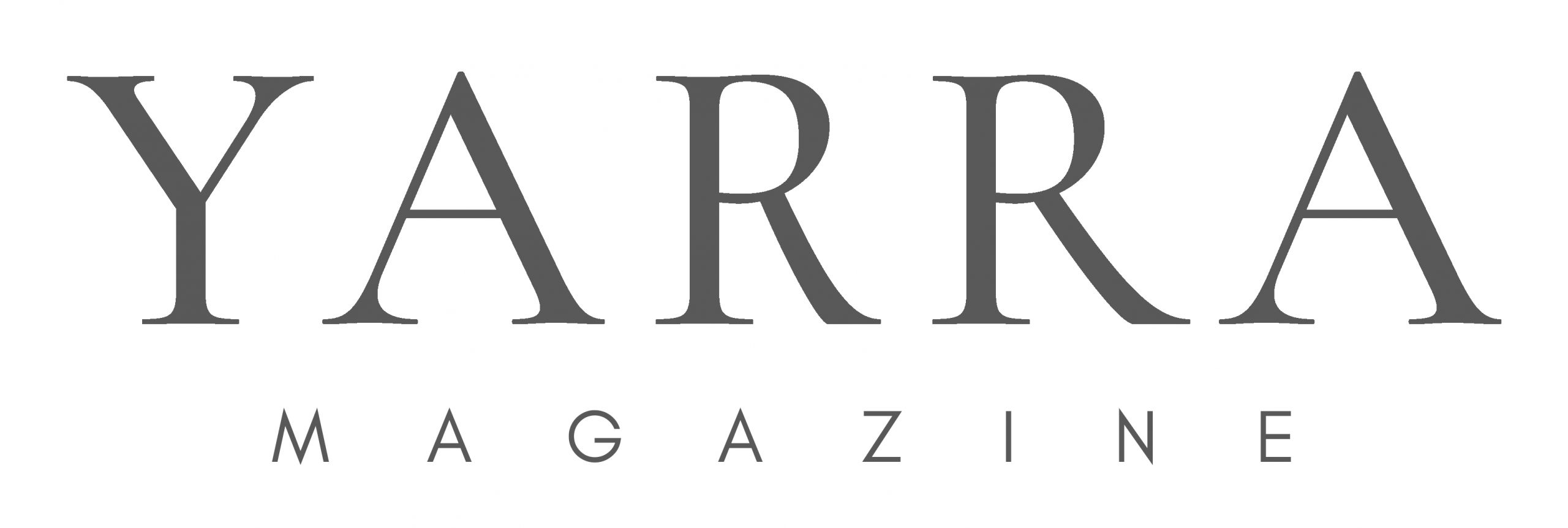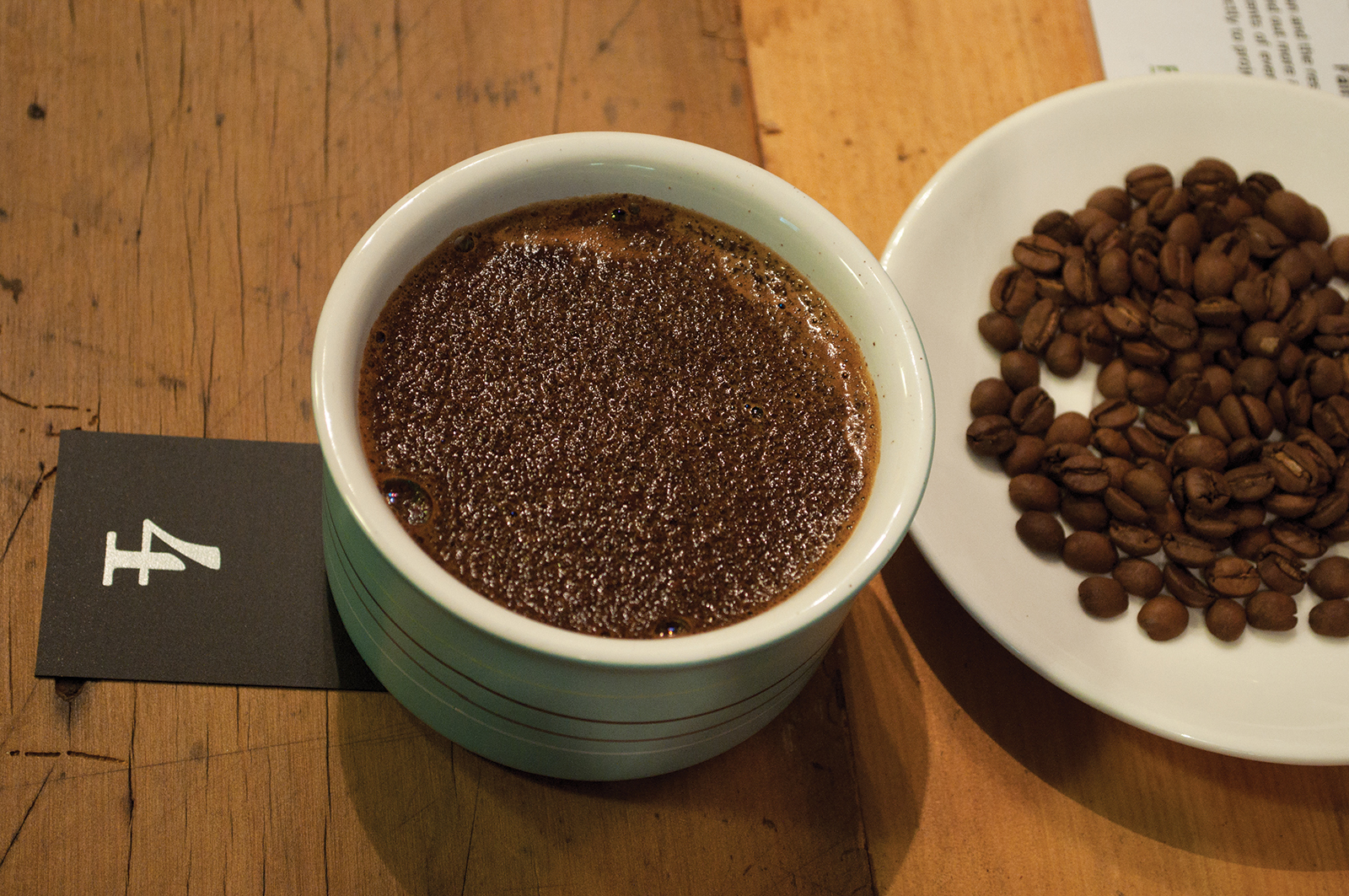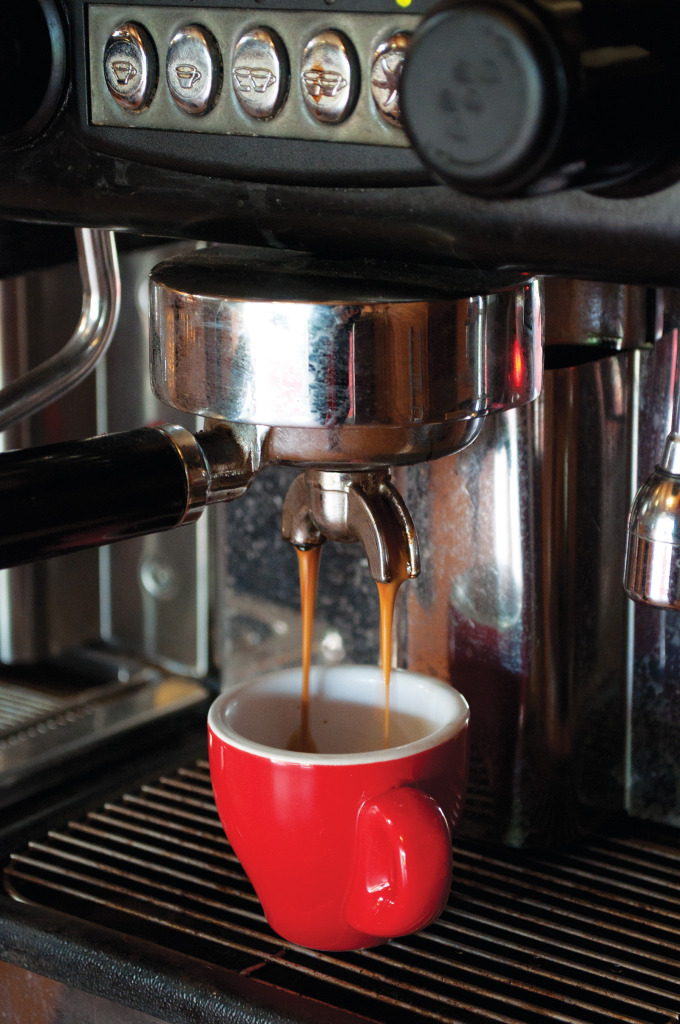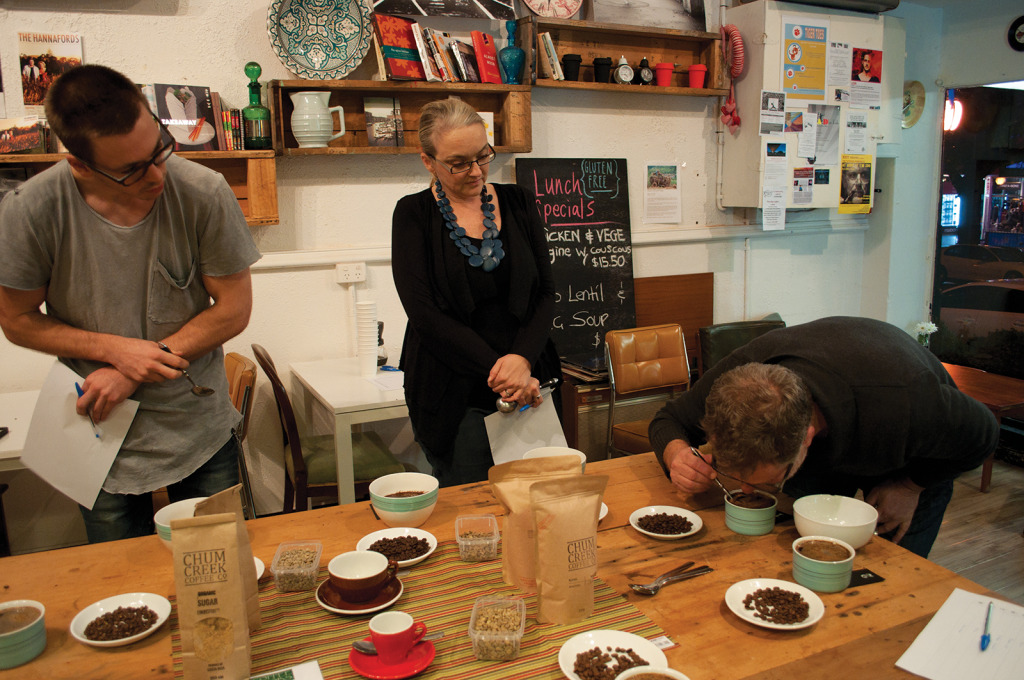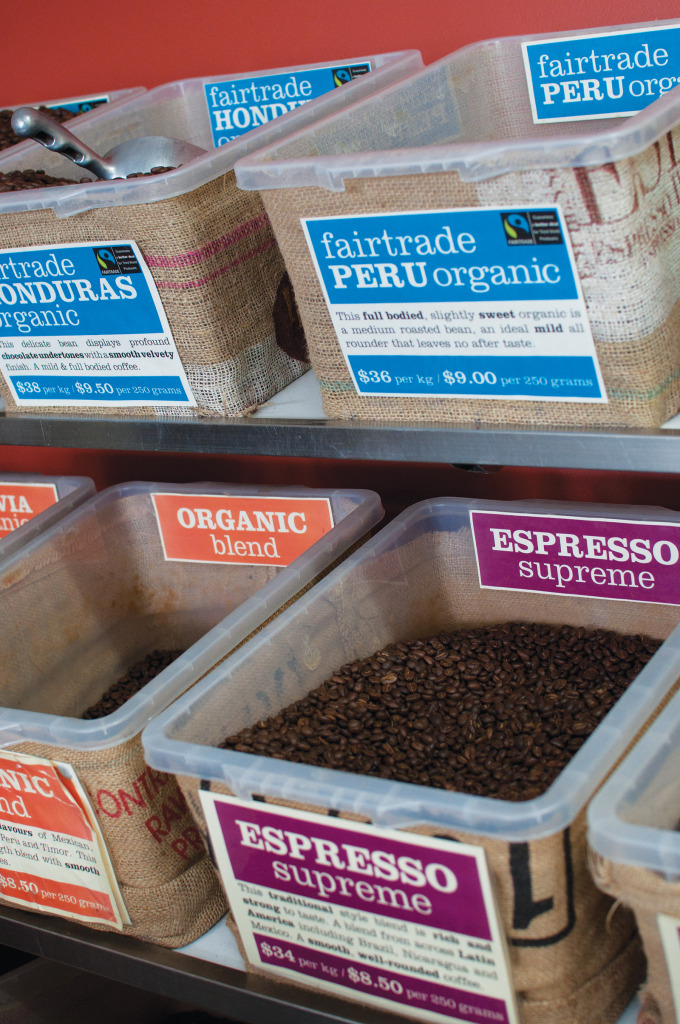The Yarra Valley has long been known locally and internationally for its high quality food and wine. Now in a quiet revolution, it’s built a reputation for a thriving and competitive coffee roasting scene.
Sheds across the Yarra Valley are sending out tantalising smells and people are responding. It’s a natural progression for some. If you’re interested in the concepts of great flavour, quality of produce and sustainable agriculture, the coffee scene is calling. After talking with some of the Valley’s small batch of specialty roasters it seems that it could also be the ultimate lifestyle choice in a region like ours.
Yarra Coffee was the trail blazer for artisan coffee in the area. David Moon started off roasting near the family home in Toolangi about twenty years ago. When Yarra Coffee started it was on its own. Slowly and patiently it built up a dedicated following for their style of roast and service and needed to move to Lilydale to have a larger space that incorporated a cafe. Yarra Coffee is now a true family business with David’s wife Helen, daughter Jacquie and sons Adam and Ben all involved in keeping the business alive and growing.
During the startup of Yarra Coffee, David Moon roasted for others as a consultant for six years. He looks back on the coffee industry now and sees huge changes. When he started there was no organic or Fair Trade options, the choice of beans in general was much narrower than today and roast style was vastly different. “The first certified true organic coffee came in from Mexico in 1995 followed by some beans from Timor in about 1996. It’s just exploded from there.”
In 2003, Andrew Hall from Great Divide Coffee came home to Buxton to roast coffee in his shed after a twenty year career in the ski fields. He’d been working on the ski fields in both Australia and California but it was time to settle back near where he’d grown up. A colleague in California introduced him to coffee roasting and the idea grew from there. Andrew’s wife Mary is American and was up for the adventure. Andrew did some training in coffee roasting in San Francisco and felt equipped to bring his skills to the area. “I had a real interest in coffee. You can only work and play in the ski world for so long. There you are managing a ski shop having a great time but no plan for the next section of your life. With coffee it’s not a seasonal industry. I enjoy it and could come home and work in my community. It seemed a great idea.”
Andrew couldn’t believe how much the food and wine scene had changed while he’d been away. It worked completely in his favour. People were interested in talking about small batch, specialty coffee. Coffee roasted to their specifications, for an event, cafe and from their region was seen as a perfect complement to the local wine and produce also being sourced in the pursuit of regionality. This was perfect timing for Andrew. He and his wife Mary have a love of bike riding so being able to set up a life in Buxton, ride their bikes through the various trails in the area and work from home was perfect.
These days he still roasts weekly for his clients. Keeping the business at a certain size means whenever you ring the Great Divide you’re speaking with the roaster, green bean buyer and the person most likely to deliver you the freshly roasted beans to your door. This is a theme that runs through a few of the local roasters. When buying from these small batch processors you are very close to the product.
This familiarity is what keeps the roasters motivated and energetic. Every Saturday morning; hail, rain or searing heat, you will find Greg Liney from the Chum Creek Coffee Company at the Healesville Organic Market sharing a stall with the local honey guy selling his freshly roasted coffee, organic unprocessed sugar and a small range of high quality teas. Greg said the connection is what keeps it all so alive for him. “This isn’t work for me. It’s what I get up and do every day. Viticulture was like that for me at Tarraford also. As soon as roasting feels like ‘work’ and I’m not having fun anymore then that’s it, I’ll question what I’m doing. At the moment it’s growing and it’s what I love. I don’t want to become enormous and loose the connection with all the parts of what I do. I started my working life as a potter. I have that type of personality.”
Ethics in the coffee scene are topical. Consumers are chasing flavour but they also want to know that the beans are sourced ethically and sustainably. Yarra Coffee’s Jacquie Moon said the demand for fair trade and or organic coffee has substantially increased in the last three years. They offer a women’s collective coffee and Jacquie feels this is absolutely something to support but they choose to not use it as a marketing tool. Cafes were receptive to Andrew’s values of moving into a fair trade rated business. “It narrows the choice of bean I can purchase but it’s something I was passionate about and people really wanted to know that there was a better choice. The fair trade labelling was something consumers could relate to.”
Greg Liney uses other mechanisms to choose his beans. He doesn’t chase the fair trade path but drawing on his strong agriculture background as a former viticulturist in the Yarra Valley he is interested in Direct Trade with farmers. Greg talks about place, farming methods used, bird safety and communities being trained in better organic sustainable crop management. Direct Trade is a process where roasters can buy the green beans directly from the growers. In doing this, they are cutting out all the middle men, including third party organisations and large coffee co-operatives. These agreements are based on a philosophy of respect and a desire for mutual benefit.
Silva Coffee is owned by Cleo and Wayne Silva. They’re based in Warburton on a five acre block that sits high on the side of a hill with a house looking directly out into the tree tops. They started after Wayne learnt his craft using modified bread makers, a sieve and a heat gun! Linking with ‘Coffee Snobs’ he networked, learnt skills and joined forums. Initially they simply roasted for friends and relatives. Silva bought their first roaster in 2010, a 5kg drum roaster from Turkey, and they have been growing steadily since. “Our ethos is to start small, build up the business and keep close to our customers,” said Cleo.
Slowly moving into providing the take away coffee for Mount Delancy markets helped them find a way to get immediate feedback from an outside audience. Cleo and Wayne see enormous benefit from providing training to the people that take on their coffee.
To stay in the medium to high end of the market, which as a small producer is their aim, it’s important to try to assist as much as possible with the whole process. It also adds another level of diversity to what they actually need to do themselves and helps keep things interesting. “It’s a good partnership because I’m good with ‘things’ but Cleo is great with people, understanding the business and pushing it out there, whereas I like to tinker in the shed,” said Wayne.
Talking flavour in coffee can be a long conversation. As in the wine industry, ‘tastings’ are held to stop roasters from getting ‘house palette’. The Gilded Lily, in Healesville, hosted a session mentored by Greg. The tastings are called Cupping Sessions. Participants smell beans, freshly ground coffee and then smell and taste wet grounds without knowing anything of origin or roast style. It’s a wonderful way to learn to smell and taste the difference in regions, roast style and blends.
It’s in this environment you see Greg’s background in the wine industry really showing through. The manner in which he blends, sources his green beans and views the delicacy with which he needs to handle his product are all very considered. Every bean is from a site that has its own unique story, and he can tell it.
All these roasters are winning awards in national competitions, debating the quality of green beans, length of roast required and dedicating time and energy to supplying the best product they can. It seems to be achieved without an intense sense of direct competition, just more an acknowledgement of the diversity of styles available and a dedication to providing their own particular style. In the end they’re all enjoying what they do and could engage a listener for hours with their stories. What is really evident is they all intend on getting better and refining their product. We as the consumers are the beneficiary of yet another specialty Yarra Valley product. Meet you for coffee soon.
WORDS & PHOTOGRAPHS Brook Powell
